Water Supply Pipe Replacement Cost
- The average cost of replacing a 30m water supply pipe is around £3,200
- Depending on the complexity, the job will take approximately 2 days to complete
-
In this article you'll find the following:
- The cost of replacing a water pipe
- Water pipe prices
- Additional costs you may need to add to your budget
- Labour costs and how to find a tradesperson
- The considerations of removing old pipework
Damaged or old water pipes can lead to deterioration in water quality caused by corrosion as well as low water pressure. The pipes could also leak, which will not only raise your water bill but could cause damage to your property. You might also want to change your water pipe because they are made from lead or iron.
Lead pipes may lead to traces of lead in your drinking water. Drinking water that contains lead is bad for your health. Lead poisoning can cause high blood pressure, memory loss, miscarriage in pregnant women and stomach pain.
If you have lead pipes, your water company may contribute towards the cost of replacement, or they may replace part of the lead pipework. Your local water company website should have details about lead pipe replacement.
Replacing your water pipes will mean you will have better quality water, improved flow rates, and more efficient water delivery to appliances, all of which will save energy.
Want to find out more about water pipe replacement costs?
Depending on the complexity of the job you can expect to pay, on average around £3,200 to replace a water pipe.
When you need a professional to install a new water pipe, we can help you get free quotes too!
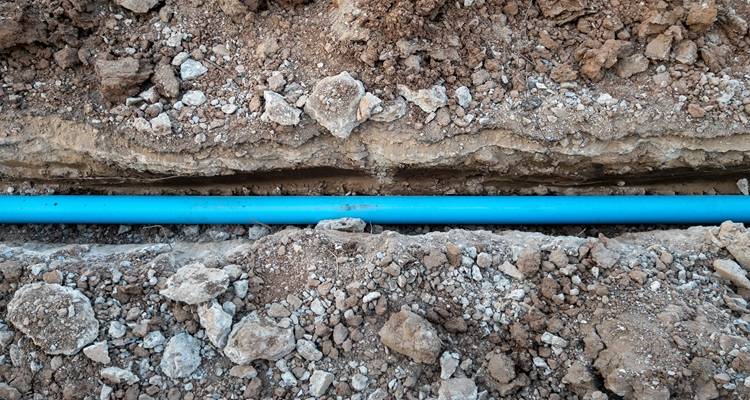
£3200
Table of Contents
- How Much is a Water Supply Pipe Replacement?
- Water Supply Replacement Prices
- Supply Costs for Water Pipe Replacement
- Types of Water Supply Types
- Labour Costs and Timescales for Water Supply Replacement
- Cost Factors for Water Supply Pipe Replacement
- Building Regulations for Water Supply Pipe Replacement
- Alternative Types of Supply Pipes
- Hiring Contractors Checklist for Water Supply Pipe Replacement
- Removing Old Water Pipes
- FAQs
How Much is a Water Supply Pipe Replacement?
Water pipe replacement costs vary according to where in the UK you are located. Prices for services in London and the South East of England are usually higher than in other parts of the UK.
Prices will also depend on the length of the pipe, how easy it is to access and the property type. For example, the average length of a water pipe from say the kitchen to the main water pipe outside might range from between 8 metres to 16 metres.
Accessibility is also a factor that must be taken into consideration. If the installation is more complex than standard, then you will pay more.
The cost of supplying and installing the pipework is usually done on a per-metre basis. The average cost per metre is around £150. That means at 8 metres, the total cost will be around £1200 and at 16 metres, the cost will be approximately £2400.
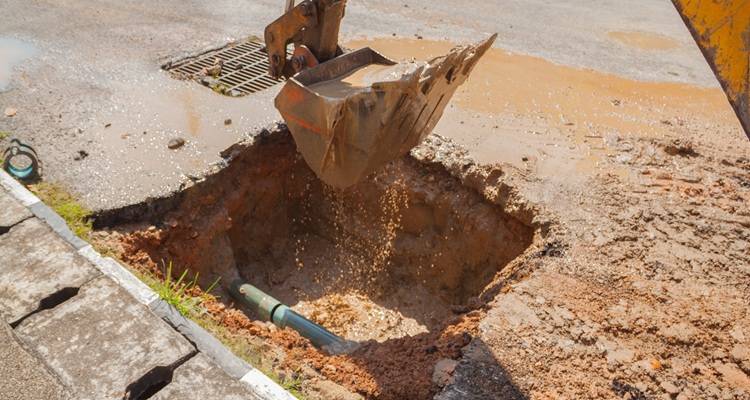
A plumber or a water installation expert can install a new pipe. A plumber, on average, charges between £27 and £80 an hour, but for a job like a replacement water pipe, they are more likely to charge per metre.
Water Supply Replacement Prices
Prices that are charged per metre will depend, of course, on the distance between the stopcock and your property.
Have a look at this chart for the average costs of replacing a water pipe per metre:
Replacing Water Pipe Cost
| Job | Length of Pipe | Cost at £100 per metre | Cost at £150 per metre | Cost at £200 per metre |
|---|---|---|---|---|
| Pipe Replacement | 8 metres | £800 | £1200 | £1600 |
| Pipe Replacement | 10 metres | £1000 | £1500 | £2000 |
| Pipe Replacement | 12 metres | £1200 | £1800 | £2400 |
| Pipe Replacement | 14 metres | £1400 | £2100 | £2800 |
| Pipe Replacement | 16 metres | £1600 | £2400 | £3200 |
| Pipe Replacement | 18 metres | £1600 | £2400 | £3200 |
| Pipe Replacement | 20 metres | £2000 | £3000 | £4000 |
| Pipe Replacement | 22 metres | £2200 | £3300 | £4400 |
Supply Costs for Water Pipe Replacement
Supply costs will include the pipework. There are six different types of water pipes commonly used in a residential installation.
| Pipe Material | Size | Average Cost Per Metre |
|---|---|---|
| Copper | 22mm | £17.00 |
| Copper | 28mm | £28.00 |
| MDPE | 20mm | £23.00 |
| MDPE | 32mm | £49.00 |
| Stainless Steel | 21.3mm | £20.00 |
| Stainless Steel | 26.7mm | £34.00 |
| PEX | 15mm | £6.00 |
| PEX | 22mm | £10.00 |
| Cast Iron | 50mm | £85.00 |
| Cast Iron | 1000mm | £110.00 |
| PVC | 20mm | £4.00 |
| PVC | 32mm | £6.00 |
| HDPE | 20mm | £14.00 |
| HDPE | 32mm | £21.00 |
Types of Water Supply Types
As you can see from the chart, there are a number of different water supply pipes available. Here’s some information about the most popular types:
Copper Pipes
Copper has always been a popular choice for pipework. Although copper is more expensive to buy, it can last for between 40 and 50 years.
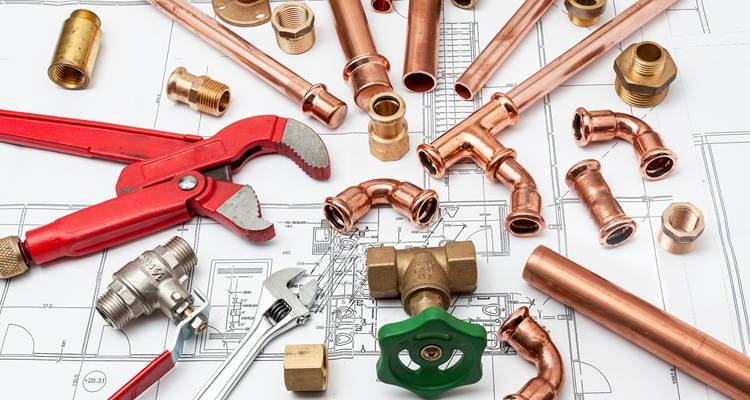
Pros of Copper Piping:
✔ May rust over time Long Lasting
✔ Lightweight and easy to install
✔ It has antibacterial properties, making it ideal for transporting drinking water
✔ Recyclable
Cons:
✖ More expensive than some other piping options
✖ Must be insulated to cope with freezing weather
✖ It can produce a build-up of scale and chlorine over time
Cast Iron Pipes
Many older homes have cast iron pipework as it used to be the ‘go-to’ material for water and drainage systems.
Pros of cast iron pipes:
✔ Durable – They can last around a 100 years
✔ High water pressure rarely causes leaks or burst pipes
✔ Reduced noise from water flow
✔ Resistant to external corrosion
Cons:
✖ May rust over time
✖ Expensive to buy
✖ Heavy to handle, making them more difficult to install than other materials
PEX Pipes (Cross-Linked Polyethylene)
PEX pipe is made using high-density polyethylene. It is a popular choice with plumbers working on residential water installations because it is flexible, which makes it easy to install.
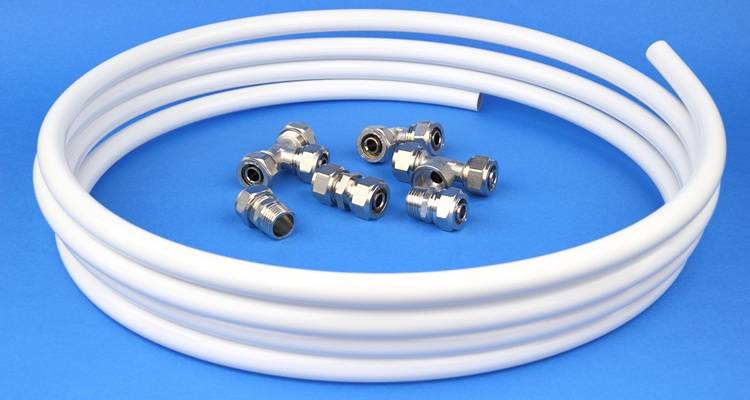
Pros of PEX Pipes:
✔ Flexible to handle – Can bend around corners
✔ Reduced need for fittings and joints
✔ Good resistance to heat
✔ Resistant to scale build-up and corrosion
Cons:
✖ Not suitable for outdoor use
✖ Solvents and chemicals will damage pipework
✖ It may not last as long as other types of Pipework
PVC Pipes
PVC pipes are made from a combination of plastic and vinyl. It is a cost-effective option for homeowners who don’t want to pay for copper. You can also buy chlorinated PVC piping (CPVC), which is often used in pipes that transport hot water.
Pros of PVC Piping:
✔ Rust and corrosion-resistant
✔ Lightweight and easy to install
✔ Affordable
Cons:
✖ When PVC isn’t chlorinated, it can warp in contact with heat
✖ Sizing options are limited
✖ Only suitable for underground pipes
Stainless steel
Stainless steel is used for water pipes because it is strong, durable and corrosion-resistant. It isn’t as cheap as other materials, but it will last decades.
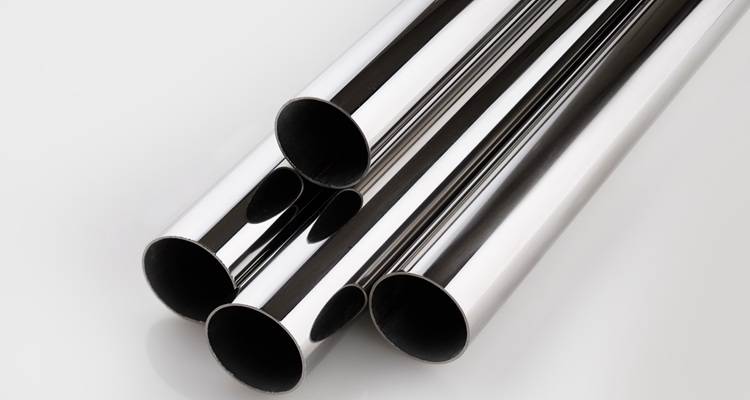
Pros of Stainless-Steel Pipes:
✔ Resistant to corrosion
✔ Durable
✔ Recyclable
Cons:
✖ Expensive
✖ Needs professional installation
✖ Heavy to handle
HDPE Pipes (High-Density Polybutylene)
HDPE pipes are used in plumbing because they are cost-effective and flexible.
Pros of HDPE Pipes:
✔ Lightweight, making them easy to handle and transport
✔ Freeze-resistant, making them ideal in cold climates
✔ Resistant to corrosion
Cons:
✖ It can become brittle and crack over time
✖ More difficult to bond together than other materials
✖ Not as strong as steel or copper
Additional Costs
An additional cost you might need to budget for will be the excavation of land when digging the trenches needed to lay the pipework if necessary. This could mean hiring a digger and labourers. The cost of hiring a digger is around £200 a day. If you have two men working for a day, then you’ll be looking at between £10 and £40 per hour, which will be between £80 and £320 for a day’s work.
If you have the soil excavation removed, the cost will depend on the volume of soil you need to take away. For example, 500 kilos of soil will take around an hour to remove and cost in the region of £145.
If you decide to save money by doing it yourself, you can bag up the soil and take it to your local council tip. Some tips allow a limited amount of soil to be thrown away free of charge. Otherwise, each borough council has their own set of charges, which on average are between £3 and £6 per 25 litre bag or similar amount.
Another option is to hire a skip. Skip hire varies depending on the size of the skip, but the average cost is around £220. A mini skip will cost between £90 and £130 for a week’s hire. Mini skips are equivalent to 30 to 40 bin bags.
You should also consider the cost of taking away the old pipework before the replacement water pipe is installed. Some contractors will include this in their quote, but others will expect you to either pay more or arrange the removal and disposal yourself.
You will also have the additional cost of a permit, which is, on average, between £90 and £150. Before digging a trench, you might also need a utility report to pinpoint the location of other underground pipes and cables. The average cost for this service is between £100 and £300 depending on what company you use and where you are located in the UK.
Another additional cost could be the restoration of your garden. This might mean relaying turf or re-planting shrubs and plants. You could do this yourself or hire a gardener to do the job.
Gardeners charge, on average, between £12 and £59 an hour. You’ll likely pay at the top end of the scale if you live in London or the South East of England, where service charges are higher than in other parts of the UK.
If you have had your pipes laid under a driveway, or you decide to lay a concrete driveway instead of laying turf, you can add this cost to your budget. The cost of laying a small 2.5m x 2.5m concrete driveway will be between £530 and £730. A larger driveway of 5m x 5m will be between £2350 and £2550 for materials and labour.
Labour Costs and Timescales for Water Supply Replacement
The labour costs for installing a water pipe will be higher than the cost of materials because the job itself is labour-intensive. Many installation jobs will involve digging a trench, which can result in additional costs.
If you are quoted a price per metre, then it is likely that this will include the trenching work. There are two methods of trenching. There is the traditional method of excavating the land for the entire length of the pipework. This might be done by hand if it is a short distance. If the length is considerable, then a digger could be used. The average cost for a traditional trench is between £100 and £125 per metre.
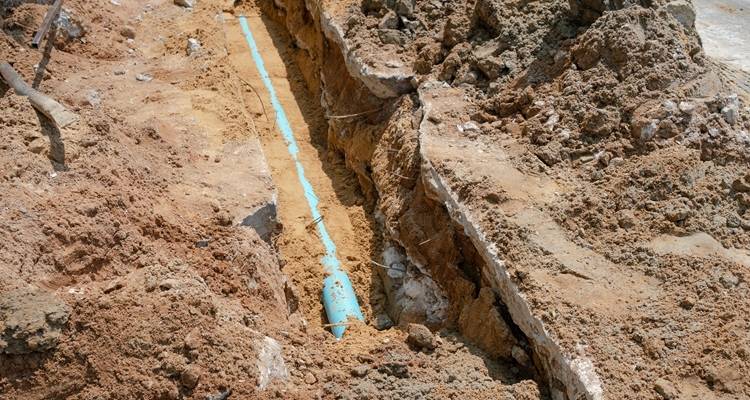
The second method is called Moling. Moling is the process of digging two pits. One is a launch pit, and the other is a reception pit. The water pipe is then fired between the two pits in a straight line.
Labour costs will increase if the job is complex or there is difficulty with access. Under these circumstances, the job will take longer which may also have a bearing on the price you pay.
On average, you can expect it to take between one and three days to install a water pipe on an average UK property. However, excavating and laying pipework on a large plot of land could take 6 days or more.
The advantage of this method is that less land is excavated, so it’s not very disruptive. It’s also cheaper. However, because the piping can only be placed in a straight line, it may be necessary to dig more than two pits to get around a corner.
The average cost for Moling is between £150 and £200 per metre.
Cost Factors for Water Supply Pipe Replacement
When installing a new water supply pipe, several key factors influence the overall cost. Below is a breakdown of the main considerations that impact pricing:
1. The Length of the Pipework
The total length of the pipe required is one of the biggest cost factors. The longer the pipe, the more materials and labour will be needed, increasing the overall cost. If your home is farther from the main water connection, expect to pay more for both materials and installation.
2. The Type of Pipes Used
Different types of pipes come with varying costs and durability. Common options include:
- Copper Pipes: Durable and long-lasting but more expensive.
- PVC Pipes: More affordable and resistant to corrosion but may not be suitable for all applications.
- MDPE (Medium-Density Polyethylene) Pipes: A popular choice for underground water supply due to flexibility and resistance to leaks.
The choice of material affects both upfront costs and long-term maintenance expenses.
3. Contractor Rates
Labour costs vary depending on the contractor’s experience, location, and complexity of the job. Highly skilled professionals may charge more, but they ensure the work meets safety and quality standards. It's advisable to obtain multiple quotes to find a balance between quality and affordability.
4. Building Works Fees
If the installation requires modifications to existing structures, additional building work costs may apply. This can include:
- Digging up driveways, gardens, or pavements
- Reinstating surfaces after the pipe installation
- Potential structural adjustments to accommodate the new piping
- These additional construction expenses can significantly impact the final cost.
5. Type of Excavation (Traditional vs. Trenchless)
The excavation method used also influences the cost of pipe replacement:
- Traditional Excavation: Involves digging a trench along the pipe’s route. This method can be labour-intensive and disruptive but may be necessary for certain installations.
- Trenchless (Mole Ploughing or Directional Drilling): A more modern and less invasive method that minimizes surface disruption. It’s often faster and can reduce labour costs, but the technology and expertise required can increase the price.
Choosing the right excavation method depends on your property layout, budget, and the extent of work needed.
Building Regulations for Water Supply Pipe Replacement
England, Wales, Scotland, and Ireland have regulations and bylaws regarding water fittings. You can see the guidance notes on the Water Regs UK website. Professional contractors will know the regulations and bylaws (in England and Wales, they are covered by The Water Supply (Water Fittings) Regulations 1999).
Using a contractor who is approved by the Water Industry Approved Plumbers Scheme (WIAPS) or one of six other approved contractor schemes means the contractor will comply with water fitting regulations and can issue a compliance certificate when the job is completed.
If you use an independent plumber, the trench for the pipework needs to be inspected by the water company to make sure it complies with regulations. If you use an approved plumber, you don’t need a trench inspection.
Apart from the WIAPS, there are other Water Safe approved schemes, including:
- The Association of Plumbing and Heating Contractors (APHC)
- Chartered Institute of Plumbing and Heating Engineering (CIPHE)
- Scottish and Northern Ireland Plumbing Employers Federation (SNIPEF)
- Anglian Water APLUS
- Severn Trent Watermark
Alternative Types of Supply Pipes
If you want pipes that are environmentally friendly, then you should choose pipes made of stainless steel or PEX. Stainless steel is recyclable, and PEX has a low-impact manufacturing process.
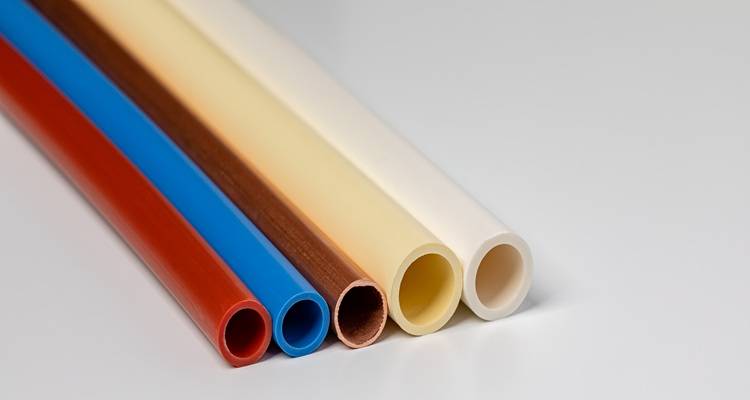
Copper piping can also be recycled, but copper mining has a negative effect on the environment. PVC is a popular choice for piping because it is lightweight and easy to install, but it damages the ozone layer.
You can buy PEX piping for between £6 and £10 per metre. Stainless steel is more expensive at between £20 and £34 per metre on average.
Hiring Contractors Checklist for Water Supply Pipe Replacement
Here is a checklist of things you should consider when you want to hire a contractor to do your water supply pipe replacement.
- Request a fully itemised quote so you can see exactly what’s included
- Make sure the contractor has the relevant qualifications and experience for the job
- Check to see whether or not they are an approved contractor, especially if you want to avoid a trench inspection
- Make sure they are insured. The minimum a contractor should have is Public Liability Insurance, which will cover property damage or an accident while they are working at your premises
- Ask if trenching, digger hire, and soil and pipe removal are included in the quote. If not, you will have to obtain separate quotes for these items.
- Obtain at least 3 quotes with the same inclusions so that you can compare each one
Removing Old Water Pipes
The treatment of old pipes comes under the conditions of the Environment Agency. You must adhere to the following conditions set out in the Environmental Agency’s Regulatory Position Statement (RPS):
- Remove any broken pieces of pipe
- Record the position of the pipes
- Dispose of any hazardous waste
Water regulations require that old pipework be disconnected.
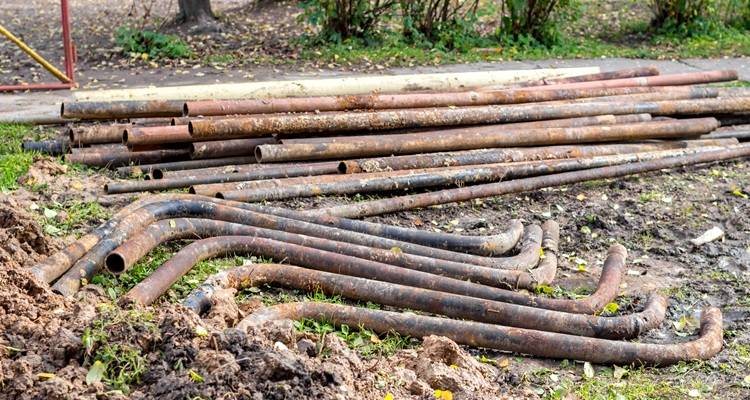
If you want the pipework removed, find out if your contractor will include the removal in your quote.
If you have to remove the pipes yourself, then you’ll need to take them to your nearest recycling centre. Lead and Copper are recyclable, and most plastic pipes are recyclable, too, but there are recycling centres that won’t accept ABS and PVC pipes, so check with your local centre.
FAQs
Do I need permission from my local council for pipe replacement?
What type of pipes are best for a home water supply line?
Copper piping has been used for water line replacement for more than fifty years. It is a popular choice for all types of water applications, including water main replacement. Although copper is more expensive to buy per metre (between £17 and £28), the pipes can last decades, they handle high temperatures well, and they resist bacteria, which makes them ideal for pipes containing drinking water.
Can I replace the water supply pipes myself?
Using a professional will likely take less time, especially if you use an approved contractor to avoid time-consuming inspections. DIY is fine for simpler plumbing jobs, but laying a new water supply pipe is better left to a professional.
If you want to save money, you can dig the trench yourself using that method. But you will need to have the trench inspected by the water company before you can fill it in. The cost to dig a trench is, on average, between £16 and £25 a metre. There might also be inspection fees to pay the water company. Contact your water company to find out about their charges.
How do I know if my water pipes need replacing?
How do plumbers check for leaks?
You can check if you have a leak yourself if you have a water meter. Make sure all your water is off and you aren’t using any appliances like a washing machine. Read your meter. Wait between 30 and 45 minutes, and then read the meter again. If the meter has moved, this may be a sign that you have a leak.








